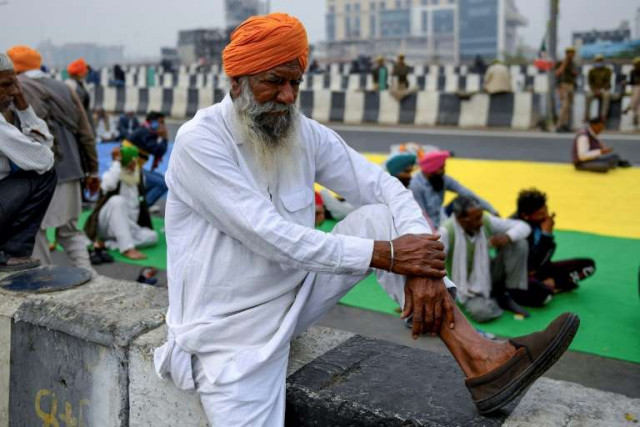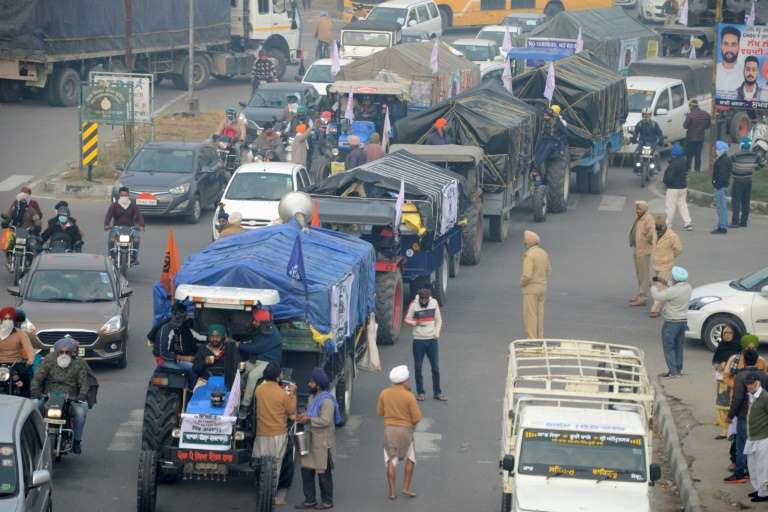Why are Indian farmers protesting?
Farmers and their workers are also abandoning agriculture in droves

Indian farmers have for months been camped on the outskirts of New Delhi in protest against new agricultural legislation, and on Tuesday thousands rampaged through the capital in a dramatic escalation of their standoff with the government.
AFP examines the laws, why they are contentious and at Prime Minister Narendra Modi's options in his stiffest challenge since coming to power in 2014.
What is the state of Indian agriculture?
India's farming sector is vast and troubled.
It provides a livelihood to nearly 70 percent of the country's 1.3 billion people and accounts for around 15 percent of the $2.7-trillion economy.
The "Green Revolution" of the 1970s turned India from a country suffering regular food shortages into one with a surplus -- and a major exporter.
But for the past few decades, farm incomes have remained largely stagnant and the sector is in sore need of investment and modernisation.
More than 85 percent of farmers have less than two hectares (five acres) of land. Fewer than one in a hundred farmers own over 10 hectares, according to a 2015-16 agriculture ministry survey.
How are farmers coping?
Water shortages, floods and increasingly erratic weather caused by climate change, as well as debt, have taken a heavy toll on farmers.
Read Protesting farmers breach barricade, enter Lal Qilla on India's Republic Day
More than 300,000 farmers have killed themselves since the 1990s. Nearly 10,300 did so in 2019, according to the latest official figures.
Farmers and their workers are also abandoning agriculture in droves -- 2,000 of them every day according to the last census in 2011.
 Modi has tried to brush off the current agitation as being stoked by an opportunistic opposition 'misleading' the farmers. AFP
Modi has tried to brush off the current agitation as being stoked by an opportunistic opposition 'misleading' the farmers. AFP
What did Modi promise?
Indian governments have long made big promises to farmers -- a crucial vote bank -- and Modi is no exception, vowing to double their incomes by 2022.
In September, parliament passed three laws that enabled farmers to sell to any buyer they chose, rather than to commission agents at state-controlled markets.
These markets were set up in the 1950s to stop the exploitation of farmers and pay a minimum support price (MSP) for certain produce.
The system has led to farmers sometimes growing crops unsuited to the local climate, such as thirsty rice in Punjab, and can be fertile ground for corruption.
But many farmers see the MSP as a vital safety net, and fear being unable to compete with large farms and being paid low prices by big corporations.
What can Modi do?
Modi has drawn fire before -- a disastrous withdrawal of large banknotes in 2016, for example -- but his popularity has held up, winning a landslide re-election in 2019.
From late 2019, there were months of protests against a contentious citizenship law culminating in sectarian riots in Delhi in February 2020 that killed over 50 people.
Depicting the farmers as "anti-national" -- as happened with the 2019 protestors -- could backfire since they enjoy widespread support among Indians.
Ignoring their demands also clashes with Modi's self-styled image as a champion of the poor.
What about the farmers?
Modi has a formidable foe in the well-organised farmers who have been camped outside New Delhi since late November despite chilly winter nights.
There they have set up schools for children, their own newspaper, social media teams, food kitchens, medical services -- and even massage machines for tired feet.
But the riots caught farmer unions off guard, who had promised police that tractor rallies would stick to agreed routes and who distanced themselves from the violence.
"At the moment the farmers are on the back foot because of the events that happened yesterday," said Parsa Venkateshwar Rao, a Delhi-based political analyst.
"The government may want to take advantage of the situation and push back at the farmers in some way or the other. In terms of public perception the violence has hurt their cause."



















COMMENTS
Comments are moderated and generally will be posted if they are on-topic and not abusive.
For more information, please see our Comments FAQ